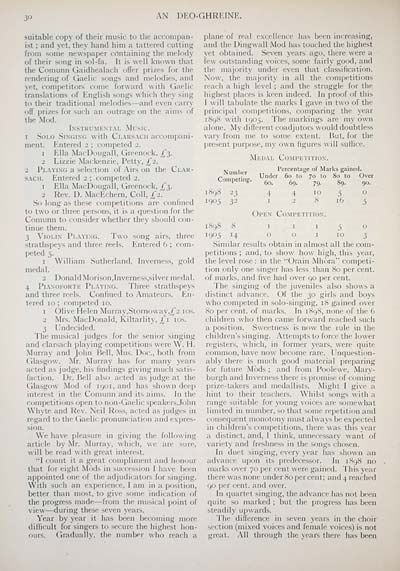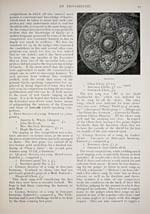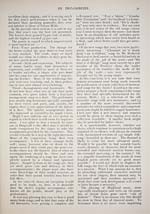Blair Collection > Deo-gréine
(46)
Download files
Complete book:
Individual page:
Thumbnail gallery: Grid view | List view

AX DEO-GHREINE.
suitable copy of their music to the accompan-
ist : and yet, they hand him a tattered cutting
From some newspaper containing the melody
of their song in sol-fa. It is well known that
the Comunn Gaidhealach offer prizes for the
rendering of Gaelic songs and melodies, and
yet, competitors come forward with Gaelic
translations of English songs which they sing
to their traditional melodies — and even cany
off prizes for such an outrage on the aims of
the Mod.
Instrumental Music
i Solo Singing with Clarsach accompani-
ment. Entered 2 ; competed 2.
1 Ella MacDougall, Greenock, £3.
2 Lizzie Mackenzie, Petty, £2.
2 Playing a selection of Airs on the Clar-
sach. Entered 2 ; competed 2.
1 Ella MacDougall, Greenock, £3.
2 Rev. D. MacEchern, Coll, £1.
So long as these competitions arc confined
to two or three persons, it is a question for the
Comunn to consider whether they should con-
tinue them.
3 Violin Playing. Two song airs, three
strathspeys and three reels. Entered 6 ; com-
peted 5.
1 William Sutherland, Inverness, gold
medal.
2 Donald Morison,Inverness,silver medal.
4 Pianoforte Playing. Three strathspeys
and three reels. Confined to Amateurs. En-
tered 10 : competed 10.
1 Olive Helen Murray, Stornow ay, (,~2 10s.
j Mrs. MacDonald, Kiltarlity, £1 10s.
3 Undecided.
The musical judges for the senior singing
and clarsach playing competitions were W. II.
Murray and John Bell, Mus. Doc., both from
Glasgow. Mr. Murray has lor many years
acted as judge, his findings giving much satis-
faction. Dr. Bell also acted as judge at the
Glasgow Mod of tgoi, and has shown deep
interest in the Comunn and its aims. In the
competitions open to non-( ìaelic speakers, John
Whyte and Rev. Neil Ross, acted as judges in
regard to the ( laelic pronunciation and expres-
sion.
We have pleasure in giving the following
article by Mr. Murray, which, we are sure,
will be read with great interest.
"] count it a great compliment and honour
that for eight Mods in succession I have hern
appointed one of the adjudicators lor singing.
With such an experience, I am 111 a position,
better than most, to give some indication of
the progress made — from the musical point of
view — during these seven years.
Year by year it has been becoming more
difficult for singers to secure the highest hon-
ours. Gradually, the number who reach a
plane of real excellence has been increasing,
and the Dingwall Mod has touched the highest
yet obtained. Seven years ago, there were a
few outstanding voices, some fairly good, and
the majority under even that classification.
Now, the majority in all the competitions
reach a high level; and the struggle for the
highest places is keen indeed. In proof of this
I will tabulate the marks I gave in two of the
principal competitions, comparing the year
[898 with 1905. The markings are my own
alone. My different coadjutors would doubtless
vary from me to some extent. But, for the
present purpose, my own figures will suffice.
Medal Competition.
v , Percentage of Marks gained.
JMim ber Undgr 6q q Sq 0ve( .
Competing. 6o _ 6g>
1898 23
1905 32
79-
( )pen Competition'.
89.
90.
1898 8 1 1 1 3 o
1905 14 001 10 3
Similar results obtain in almost all the com-
petitions ; and, to show how high, this year,
the level rose : in the "Orain Mhòra" competi-
tion only one singer has less than 80 per cent,
of marks, and five had over 90 per cent.
The singing of the juveniles also shows a
distinct advance. Of the 30 girls and boys
who competed in solo-singing, 18 gained over
80 per cent, of marks. In 1898, none of the 6
children who then came forward reached such
a position. Sweetness is now the rule in the
children's singing. Attempts to force the 1< >w er
registers, which, in former years, were quite
common, have now become rare. Unquestion-
ably there is much good material preparing
for future Mods; and from Poolewe, Marx-
burgh and Inverness there is promise of coming
prize-takers and medallists. Might 1 give a
hint to their teachers. Whilst songs w ith a
range suitable for young voices are somewhat
limited in number, so that some repetition and
ci »nsequen1 monotony must always be expected
in children's competitions, there was this year
a distinct, and, I think, unnecessary want of
variety and freshness In the songs chosen.
In duet singing, every year has shown an
advance upon its predecessor. In 1898 no
marks over 70 per cent were gained. This year
there was none under 80 per cent; and 4 reached
g« ) per cent, and over.
In quartet singing, the advance has not been
quite so marked; but the progress has been
steadily upwards.
The difference in seven years in the choir
section (mixed voices and female voices) is not
great. All through the years there has been
suitable copy of their music to the accompan-
ist : and yet, they hand him a tattered cutting
From some newspaper containing the melody
of their song in sol-fa. It is well known that
the Comunn Gaidhealach offer prizes for the
rendering of Gaelic songs and melodies, and
yet, competitors come forward with Gaelic
translations of English songs which they sing
to their traditional melodies — and even cany
off prizes for such an outrage on the aims of
the Mod.
Instrumental Music
i Solo Singing with Clarsach accompani-
ment. Entered 2 ; competed 2.
1 Ella MacDougall, Greenock, £3.
2 Lizzie Mackenzie, Petty, £2.
2 Playing a selection of Airs on the Clar-
sach. Entered 2 ; competed 2.
1 Ella MacDougall, Greenock, £3.
2 Rev. D. MacEchern, Coll, £1.
So long as these competitions arc confined
to two or three persons, it is a question for the
Comunn to consider whether they should con-
tinue them.
3 Violin Playing. Two song airs, three
strathspeys and three reels. Entered 6 ; com-
peted 5.
1 William Sutherland, Inverness, gold
medal.
2 Donald Morison,Inverness,silver medal.
4 Pianoforte Playing. Three strathspeys
and three reels. Confined to Amateurs. En-
tered 10 : competed 10.
1 Olive Helen Murray, Stornow ay, (,~2 10s.
j Mrs. MacDonald, Kiltarlity, £1 10s.
3 Undecided.
The musical judges for the senior singing
and clarsach playing competitions were W. II.
Murray and John Bell, Mus. Doc., both from
Glasgow. Mr. Murray has lor many years
acted as judge, his findings giving much satis-
faction. Dr. Bell also acted as judge at the
Glasgow Mod of tgoi, and has shown deep
interest in the Comunn and its aims. In the
competitions open to non-( ìaelic speakers, John
Whyte and Rev. Neil Ross, acted as judges in
regard to the ( laelic pronunciation and expres-
sion.
We have pleasure in giving the following
article by Mr. Murray, which, we are sure,
will be read with great interest.
"] count it a great compliment and honour
that for eight Mods in succession I have hern
appointed one of the adjudicators lor singing.
With such an experience, I am 111 a position,
better than most, to give some indication of
the progress made — from the musical point of
view — during these seven years.
Year by year it has been becoming more
difficult for singers to secure the highest hon-
ours. Gradually, the number who reach a
plane of real excellence has been increasing,
and the Dingwall Mod has touched the highest
yet obtained. Seven years ago, there were a
few outstanding voices, some fairly good, and
the majority under even that classification.
Now, the majority in all the competitions
reach a high level; and the struggle for the
highest places is keen indeed. In proof of this
I will tabulate the marks I gave in two of the
principal competitions, comparing the year
[898 with 1905. The markings are my own
alone. My different coadjutors would doubtless
vary from me to some extent. But, for the
present purpose, my own figures will suffice.
Medal Competition.
v , Percentage of Marks gained.
JMim ber Undgr 6q q Sq 0ve( .
Competing. 6o _ 6g>
1898 23
1905 32
79-
( )pen Competition'.
89.
90.
1898 8 1 1 1 3 o
1905 14 001 10 3
Similar results obtain in almost all the com-
petitions ; and, to show how high, this year,
the level rose : in the "Orain Mhòra" competi-
tion only one singer has less than 80 per cent,
of marks, and five had over 90 per cent.
The singing of the juveniles also shows a
distinct advance. Of the 30 girls and boys
who competed in solo-singing, 18 gained over
80 per cent, of marks. In 1898, none of the 6
children who then came forward reached such
a position. Sweetness is now the rule in the
children's singing. Attempts to force the 1< >w er
registers, which, in former years, were quite
common, have now become rare. Unquestion-
ably there is much good material preparing
for future Mods; and from Poolewe, Marx-
burgh and Inverness there is promise of coming
prize-takers and medallists. Might 1 give a
hint to their teachers. Whilst songs w ith a
range suitable for young voices are somewhat
limited in number, so that some repetition and
ci »nsequen1 monotony must always be expected
in children's competitions, there was this year
a distinct, and, I think, unnecessary want of
variety and freshness In the songs chosen.
In duet singing, every year has shown an
advance upon its predecessor. In 1898 no
marks over 70 per cent were gained. This year
there was none under 80 per cent; and 4 reached
g« ) per cent, and over.
In quartet singing, the advance has not been
quite so marked; but the progress has been
steadily upwards.
The difference in seven years in the choir
section (mixed voices and female voices) is not
great. All through the years there has been
Set display mode to: Large image | Transcription
Images and transcriptions on this page, including medium image downloads, may be used under the Creative Commons Attribution 4.0 International Licence unless otherwise stated. ![]()
| Early Gaelic Book Collections > Blair Collection > Deo-gréine > (46) |
|---|
| Permanent URL | https://digital.nls.uk/76698199 |
|---|
| Description | A selection of books from a collection of more than 500 titles, mostly on religious and literary topics. Also includes some material dealing with other Celtic languages and societies. Collection created towards the end of the 19th century by Lady Evelyn Stewart Murray. |
|---|
| Description | Selected items from five 'Special and Named Printed Collections'. Includes books in Gaelic and other Celtic languages, works about the Gaels, their languages, literature, culture and history. |
|---|

